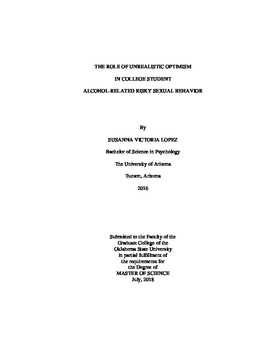| dc.contributor.advisor | Leffingwell, Thad Ryan | |
| dc.contributor.author | Lopez, Susanna Victoria | |
| dc.date.accessioned | 2019-03-20T19:10:01Z | |
| dc.date.available | 2019-03-20T19:10:01Z | |
| dc.date.issued | 2018-07-01 | |
| dc.identifier.uri | https://hdl.handle.net/11244/317626 | |
| dc.description.abstract | Introduction: Risky sexual behavior (RSB), especially after alcohol use (RSB-A), remains an issue among college students (Cooper, 2002). Engaging in RSB often results in sexually transmitted infections and unintended pregnancy, which are increasing at alarming rates among young adults (CDC, 2016; Finer & Zolna, 2014). One risk factor for engaging in RSB and RSB-A may be unrealistic optimism (UO), or a misperception of risk of experiencing a negative event. Though UO has been found to be related to engagement in certain behaviors such as smoking (Shepperd et al., 2013), less is known about the role of UO in RSB-A among college students. The purpose of the current study was to investigate the presence of UO in a college student sample, analyze associations between UO and current RSB and RSB-A patterns, and to analyze alcohol use as a moderator in the relation between RSB and RSB-related UO. | |
| dc.description.abstract | Methods: Undergraduate students (N = 665) from a large, Southern Plains university completed an online study assessing RSB patterns, alcohol use, and risk perceptions of RSB-related consequences. | |
| dc.description.abstract | Results: Dependent sample t-tests revealed that, relative to perceived risk of the average college student, students reported lower perceived personal risk of sexual activity (with and without concurrent alcohol use), unintended pregnancy, and contracting HPV and chlamydia (ps < .01). One-sample t-tests revealed that, compared to national data, students overestimated their own chances of sexual engagement with 1-3 partners and underestimated chances of HPV infection and sexual engagement with 4 or more partners in the next year (ps < .01). Alcohol use was found as a moderator between RSB and sexual activity with one partner, condom use, sexual activity after alcohol use, and condom use during alcohol-related sexual activity (ps < .001) such that lower alcohol use strengthened these relationships. | |
| dc.description.abstract | Discussion: The current study demonstrated the presence of UO regarding RSB-A and related consequences in a college student sample, but also demonstrated acknowledgement of higher risk of these consequences among those reporting higher alcohol use. Future research should investigate these behaviors and consequences over time. Implications for intervention are discussed. | |
| dc.format | application/pdf | |
| dc.language | en_US | |
| dc.rights | Copyright is held by the author who has granted the Oklahoma State University Library the non-exclusive right to share this material in its institutional repository. Contact Digital Library Services at lib-dls@okstate.edu or 405-744-9161 for the permission policy on the use, reproduction or distribution of this material. | |
| dc.title | Role of Unrealistic Optimism in College Student Alcohol-Related Risky Sexual Behavior | |
| dc.contributor.committeeMember | Hawkins, Misty | |
| dc.contributor.committeeMember | Clawson, Ashley Hum | |
| osu.filename | Lopez_okstate_0664M_15862.pdf | |
| osu.accesstype | Open Access | |
| dc.description.department | Psychology | |
| dc.type.genre | Thesis | |
| dc.type.material | text | |
